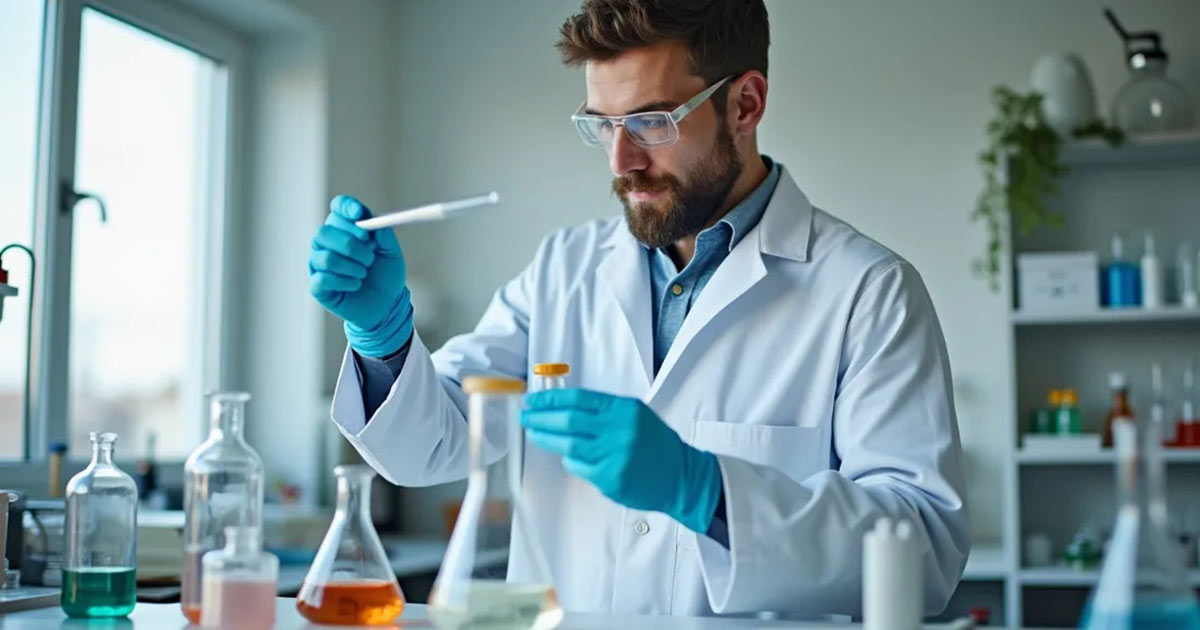
Master of Science (M.Sc.) in Chemistry - Analytical
By NCTA Team Last Updated: January 02, 2026Overview:
Analytical chemistry is a branch of chemistry that focuses on understanding matter's composition through qualitative and quantitative analysis. Using classical methods and advanced techniques like spectroscopy and chromatography, it is vital in pharmaceuticals, environmental monitoring, food safety, material characterization, clinical diagnostics, bridging theory, and practical applications in science and industry.
About the Course:
Master of Science in Analytical Chemistry is a two-year postgraduate program designed to provide in-depth knowledge and practical skills in the advanced principles and techniques of analytical chemistry. This program equips students with the expertise to identify, quantify, and analyze chemical substances, preparing them for diverse careers in research, industry, and academia.
Graduates of this program are well-prepared for roles in quality control, research and development, environmental monitoring, and more, or for pursuing further studies in chemistry and related disciplines. The course integrates theoretical knowledge with practical applications, making it ideal for those seeking to excel in the dynamic and essential field of analytical chemistry.
Why Choose M.Sc. in Analytical Chemistry:
Analytical chemistry is a dynamic and essential field that offers numerous opportunities for those interested in understanding the composition of substances and their practical applications. Here are some reasons why pursuing a career in analytical chemistry is a great choice:
- Quality Control & Safety: Analytical chemistry ensures the quality, purity, and safety of products in industries like pharmaceuticals, food and beverages, and chemicals.
- Regulatory Compliance: Helps industries meet stringent regulatory standards, maintaining product consistency and safety.
- Sustainability: Plays a vital role in detecting hazardous chemicals and minimizing environmental risks, contributing to sustainability efforts.
- Environmental Protection: Helps in preventing contamination and protecting ecosystems, promoting long-term environmental health.
- High Demand: Industries such as pharmaceuticals, healthcare, environmental agencies, and chemical manufacturing are actively seeking skilled analytical chemists.
- Career Growth: The field offers strong career advancement opportunities, with roles like analytical chemist, laboratory manager, quality assurance specialist, and research scientist.
Responsibilities of an Analytical Chemist:
An analytical chemist examines substances to determine their composition, structure, and properties, playing a key role in research, development, and quality control to ensure product safety, efficacy, and compliance across industries. Key responsibilities include:
- Identify and quantify components in samples, such as raw materials, finished products, or environmental specimens.
- Conduct qualitative and quantitative analysis using techniques like spectroscopy, chromatography, and mass spectrometry.
- Develop and validate analytical methods to ensure precision, accuracy, and reliability.
- Monitor product quality during manufacturing.
- Ensure that products meet regulatory standards and specifications.
- Investigate failures, contaminations, or anomalies in chemical processes or products.
- Support the creation of new products by analyzing prototypes and optimizing formulations.
Course Curriculum:
M.Sc. in Analytical Chemistry curriculum combines theoretical knowledge, practical laboratory skills, and industry-relevant research to prepare students for leadership roles in research, industry, and academia. Key subjects include:
Semester I:
- Advanced Inorganic Chemistry
- Principles of Analytical Chemistry
- Physical Chemistry for Analytical Chemists
- Introduction to spectroscopy
Semester II:
- Chromatography Techniques
- Mass Spectrometry and Atomic Spectroscopy
- Electrochemical Analysis
- Analytical Chemistry in Pharmaceuticals
Semester III:
- Environmental Analytical Chemistry
- Biochemical and Clinical Analysis
- Ethical considerations in analytical research.
- Nanomaterials and Analytical Applications
Semester IV:
- Advanced Separation Techniques
- Forensic and Toxicological Analysis
- Advanced Bioanalytical Techniques
- Green Chemistry and Analytical Techniques
Career Opportunities:
Graduates of an M.Sc. in Analytical Chemistry have a wide range of career opportunities across various industries and sectors due to the growing demand for skilled professionals in chemical analysis, quality control, and research. Here are some key career paths:
- Analytical Chemist
- Environmental Analyst
- Forensic Chemist
- Toxicologist
- Regulatory Affairs Specialist
- Graduates can find placement in industries, including:
- Pharmaceuticals & Biotechnology
- Environmental Agencies & Research Institutes
- Food and Beverage
- Forensic and Law Enforcement
- Academia and Research Institutions
Further Studies and International Opportunities:
Many graduates of the M.Sc. in Analytical Chemistry pursue further studies abroad to deepen their expertise or specialize in specific areas of analytical chemistry. International institutions offer advanced research opportunities, Ph.D. programs, and access to global networks in science and industry.
Our M.Sc. degree is internationally recognized and accepted, allowing students to continue their academic and professional journeys worldwide. Should you wish to explore study opportunities abroad, our team is here to assist you with the necessary guidance and support for application processes, scholarships, and visa requirements.
With a Master of Science in Analytical Chemistry, graduates can expect to find diverse and rewarding roles in industries that require precise chemical analysis, regulatory compliance, and scientific research, both domestically and globally.
Salary Expectations:
Salaries for graduates with an M.Sc. in Analytical Chemistry can range from $50,000 to over $120,000 per year, depending on the job role, experience, and location. Roles such as Analytical Chemist, Research Scientist, Quality Control Analyst, and Clinical Chemist typically offer salaries within this range. The field provides lucrative career opportunities with the potential for growth and advancement.
Course Features
| Course Code | UDC-564 |
| Duration | 2 Years |
| Category | Master of Science (M.Sc.) in Chemistry - Analytical |
| Eligibility | BACHELOR'S Degree in Relevant Field/ B.Sc(Hons) in Relevant Stream/ B.Sc - PCM, PCB/B.E/B.Tech - Mechanical |
| Fees | 2×28000= 56,000 |
To know more about our this course, feel free to call us at:
+91 9733600770Ready to Enroll in This Course?
Start your learning journey today and unlock your potential!
Apply Now for This Course
